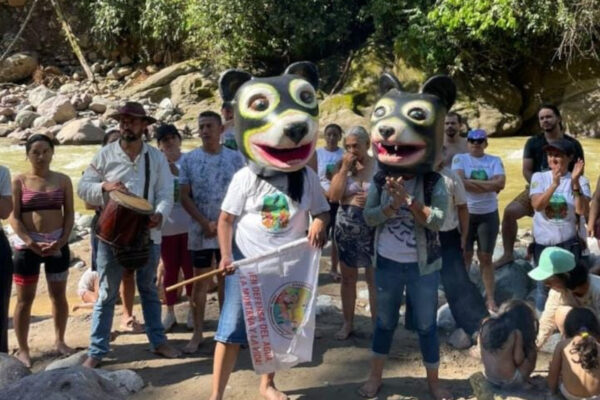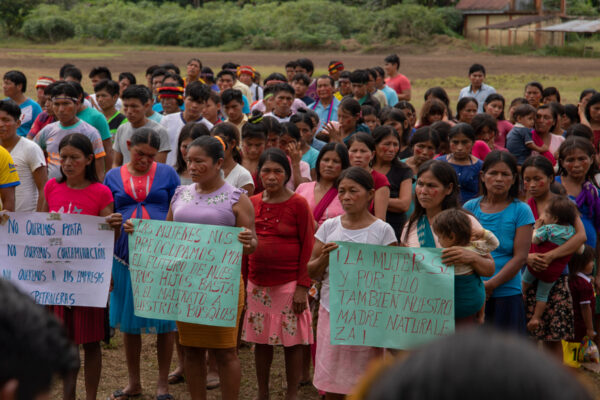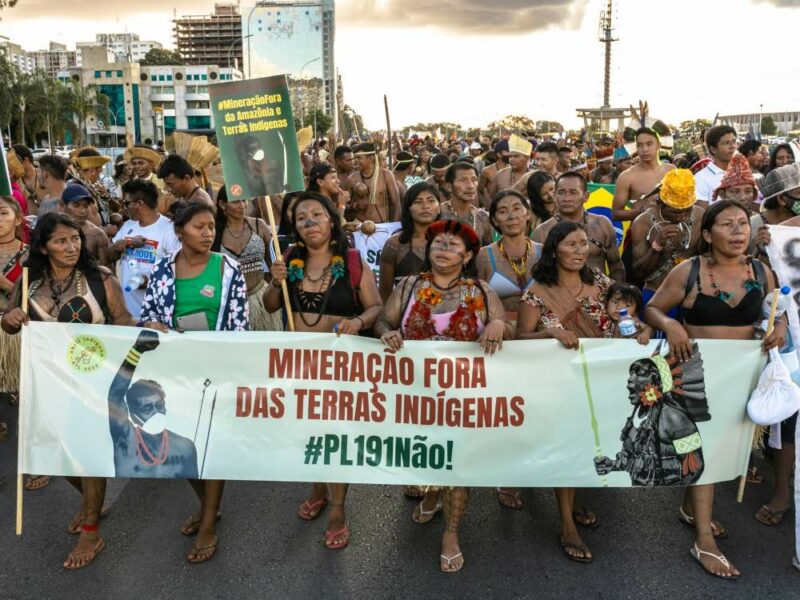
The terrible murder of Apu Quinto Inuma Alvarado, leader of the Santa Rosillo de Yanayacu Native Community in the San Martin Region, on November 29, 2023, adds a new victim of the violence unleashed in the Peruvian Amazon. Apu Quinto dedicated his life to the protection of his territory and the Amazon forest, to safeguard the future of his people. He was murdered while returning from a meeting of environmental defenders, where he presented again the current situation of threats to his community from the usual actors: land traffickers, drug traffickers and illegal loggers.
This latest murder of an environmental defender coincides with the start of the COP in Dubai, where urgent action is being discussed in the face of the climate crisis, which is directly affecting us with ever-higher temperatures and natural phenomena that threaten the continuity of life on our planet. Preserving the Amazon from the impacts of corporate extractivism and illegal economies is one of the indispensable actions to deal with the coming crisis. However, the Amazon has become the most dangerous place in the world for environmental defenders, due to the growing power of criminal actors that increasingly control this part of the national territory.
There are already 31 indigenous defenders murdered since 2013 in Peru, according to figures from Aidesep. The measures taken to date by the Peruvian State and international cooperation are not succeeding in reducing either the attacks or the rate of invasions of illegal activities in indigenous territories. In addition, in recent months, we have registered an intensification of intimidating calls and incidents of follow-up to defenders involved in emblematic cases in the search for justice who are in the same situation, living in risky conditions; and thousands of indigenous people whose communities have been invaded, surrounded or co-opted. In none of the above cases have adequate and sustained security measures been implemented.
The mechanisms for investigation and prosecution of crimes against environmental defenders are limited, causing that no murder case has found effective justice. In these very days, almost a decade after the murder of Edwin Chota and 3 other leaders of the Saweto Community, their relatives are still seeking justice, in a judicial process that has had to restart from scratch, due, among other things, to the suspicious inoperability of the prosecutors in charge of the case. A similar situation occurred with Arbildo Melendez, whose confessed murderer was convicted of “culpable homicide” with the endorsement of the prosecutor in charge of the case at the time.
An Intersectoral Mechanism for the Protection of Human Rights Defenders has existed in the country for two years, created by Supreme Decree 004-2021-JUS. The design of this Mechanism assigns responsibilities to nine state entities; if diligently fulfilled, it could mean a significant advance in terms of prevention, identification of the causes of the main risks, urgent protection of individuals and communities at risk and the fight against impunity.
However, none of this has been fulfilled. In the case of the murder of the apu Inuma, we have today the condolences of four member ministries of the Mechanism that offer to “continue working together”. The reality is that the State has not allocated the necessary resources for this multisectoral body to fulfill its objectives and that the Ministry of the Interior has not fulfilled its obligations to co-lead the Mechanism, nor has it even assumed it as a priority of its sector. Furthermore, in the specific case of the Santa Rosillo community, the millions of dollars raised through the sale of carbon credits to finance the Cordillera Azul National Park, which overlaps with their ancestral territory, have not been used to finance protection measures for the environmental defenders of the Kichwa people, who like Quinto, are the ones who really risk their lives for the conservation of their forests.
The murder of Apu Quinto cannot remain “just another case” that generates indignation and is then forgotten. On the contrary, it is time to assume and declare that the Amazon is in emergency, in order to make the protection of defenders a national and international priority. In order to protect the lives of threatened defenders, short-term actions and a more in-depth strategy are required, so that the announced measures leave virtuality and translate into concrete actions for the Ministry of the Interior and all the actors involved.
As immediate measures we demand:
- Public declaration with urgent actions for the protection of the Amazon and its defenders: That the multisectoral mechanism, endorsed by the president of the council of ministers, publicly declare concrete emergency measures to protect environmental defenders and confront the advance of criminal economies in the Amazon.
- Reaction to threats: The protection mechanism, in coordination with the affected indigenous organizations, should establish a list of territories where immediate security plans should be implemented.
- Attention to the threatened environment: Protection for the family of the apu Inuma and care for his relatives, as well as for those involved in the Saweto case. Also preventive and collective protection of his community and all communities at risk.
- Territorial security: Establish a high-level commission to unblock pending collective titling processes for threatened communities and peoples, while regional governments should accelerate their community titling efforts. The State should also ensure that Ministerial Resolution 136-2022-MINAGRI, which allows for the territorial demarcation of Native Communities within Natural Protected Areas, is implemented in compliance with its obligations under the national and international regulatory framework.
- No more impunity: Demand a real commitment from the Judiciary and the Public Prosecutor’s Office to give priority attention to processes involving violence against defenders. A system must be established whereby prosecutors and judges are held accountable and investigated for their procedural actions to the detriment of defenders.
- Capacities and budget: Provide the mechanism with real capacities and budget to be implemented.
- Participation and dialogue with indigenous organizations: Create a continuous and direct mechanism for dialogue between Aidesep and its bases, with the different actors involved in the mechanism, to evaluate the situation of violence and threats against defenders on a monthly basis.
- Review climate policies: Restructure all state intervention policies, official international cooperation projects and civil society projects linked to the fight against Amazon deforestation, prioritizing actions that guarantee the life and protection of indigenous territories and the generation of economic opportunities for the communities most at risk. Measures should also be taken to ensure that climate and conservation funds reach indigenous peoples directly so that they themselves can manage them, guaranteeing a conservation and development model that complies with their right to self-determination.
- Redesign state policies to combat illegal activities: Existing policies have failed. Crops are increasing exponentially despite decades of eradication. Illegal mining has not been controlled, illegal logging has continued, and all these activities are now strengthened and articulated with the endorsement or complicity of authorities. A large part of the failure is that these policies are designed without incorporating the vision of the indigenous peoples, openly failing to comply with the obligations of consultation and participation to which the Peruvian state has committed itself through Convention 169-ILO.













